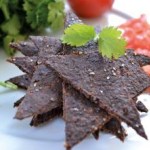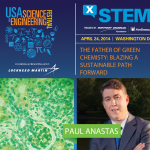sustainable
Image of cricket chips called "chirps" from Six Foods. (http://www.sixfoods.com/#product)
Crickets are the first insect to now be farmed for human consumption in the United States. I'll admit the thought of snacking on cricket flour-based chips is not exactly appetizing. But the process of farming insects over more traditional livestock seems to be less wasteful. Insect farming is a more efficient way of producing dietary protein as it takes much less feed and water to raise insects as compared to cattle. In addition, greenhouse gas emissions from crickets are much lower than…
Guest Blog by Paul Anastas
Assistant Administrator for the U.S. EPA for Research and Development and the Agency Science Advisor
For too long sustainability and environmental protection have been defined by those saying that we need to do less, have less, expect less. For too long, we have been told that we need to consume less energy, use less materials, travel less, give up the vast array of modern conveniences. I couldn't disagree more and thank goodness the leading inventors and designers of our time agree with me.
I believe the problem of sustainability largely isn'…
Guest Blog By Lek KadeliActing Assistant Administrator in the U.S. Environmental Protection Agency's (EPA) Office of Research and Development (ORD)
Each spring around the same time that so much of the country is swept up in the “madness” of amateur basketball tournaments, a dedicated team of employees at the U.S. Environmental Protection Agency are finishing up preparations to host student teams for another hard-fought college challenge: EPA’s P3 student design competition for sustainability.
While participants may not grab national headlines, the long-term benefits of their efforts have the…
If you really want to protect the environment, it's not enough just to care about it; you need to learn and really understand something in order to protect it. That's the lesson that Dr. Paul Anastas' father taught him after bulldozers had destroyed the wetlands down the hill from his childhood home, turning what was once a place for adventure and natural beauty into parking lots and an office park.
Paul clearly took this early lesson to heart. Widely known as the "Father of Green Chemistry," he has devoted his career to learning about how to create a more sustainable society.
For him, this…
I'm going to be buried under my book for the next few days as the Adapting-In-Place book finally goes to my editor, but I did want to respond to this email, or rather, get my readers to respond. Gwen writes:
"I just lost my job, and after a lot of late nights and panicked budget making, we think we can get along on just my husband's income, but it will be very tough and there will be no money at all for extras of any kind. We've always used our discretionary income to support things we care about - in the last few years this was local farmers and craftspeople, and making ethical choices…
The World Science Festival, is a five day-long extravaganza of science in New York City that is coming up this year on June 2-6. The World Science Festival (now in it's third year) is not only for adults interested in science society- it is for kids, too. That why I will bring my 9 year old daughter with me. She is clamouring for high heels to wear to the opening night gala honoring Stephen Hawking. On Sunday, the heels will come off for some fun at the Festival Street Fair, featuring Discovery Theater and Author's Alley.
On Friday evening, I will participate in a panel called Food 2.0:…
Just an accounting of the last month of local food, sustainable agriculture, and science/food/safety articles is difficult to produce. Let alone a full understanding of them. One problem with studying the topic is that the proliferation of literature on sustainable ag and its associated elements brings with it sifting and organizing difficulties. It's a microcosm of the problem of the internet itself - more information leads to more traffic, leading to slower travel. How to make sense of it all?
Here is a quick sampling of some recent literature on what we might call the current "food"…



